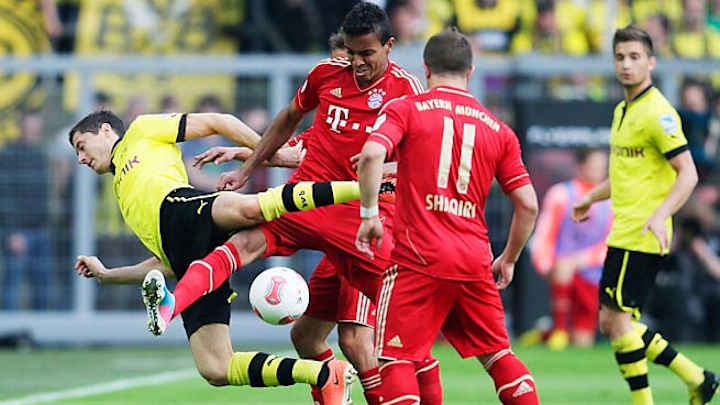What's on the line for Bayern, Dortmund, all of Germany in CL final

Five (final) thoughts on the all-German Champions League final ...
1. This doesn't mean the Bundesliga is the best league in the world. What constitutes "the best" football league? If it's affordability, sustainability, indigenous talent on pitches and a decent stadium experience, the Bundesliga is your bag. Most of these factors, while commendable, are only of real concern to German fans, however. As an international entertainment "product," the Bundesliga is still miles behind the Premier League and will continue to be so unless there are three or four Bayern Munichs, competing for the best international players and entering the Champions League with a realistic view to winning it. That will take a lot of time and even more hard, smart work, even if dormant giants like Hamburger SV, 1.FC Köln or VfB Stuttgart will begin to wake up.
2. For Dortmund, there is more at stake. Perceived wisdom suggests that all the pressure is on Bayern after two final defeats in a row, and a perfect domestic season, and it's true that Dortmund doesn't have to win this game. The club's official hashtag for the final -- #fairytale -- suggests as much. (Bayern's is #packmas, a Bavarian version of "let's do it"). But for the grand scheme of things, it's actually more important for Dortmund to win this game than Bayern. Klopp's team -- at least in their current guise -- have only an outside chance to get within 90 minutes of a trophy in the near future, whereas Bayern will continue to be contenders for years to come. Dortmund saw in 1997 what a difference the European Cup made to its fortunes: It's a shortcut to more fans, better sponsorship deals and a marketing bonanza. In a league that has to live within its means, nothing breeds success like success. If Dortmund really wants to close the gap with Bayern, getting one over at Wembley is the perfect -- once-in-a-lifetime -- opportunity.
CREDITOR: Altidore leads Americans Abroad season awards
3. German football has learned the lessons from the past. In 2008, newly promoted TSG Hoffenheim beat Dortmund 4-1 with a pressing game of unbelievable intensity. Ralf Rangnick was in charge of 1899 that day. Jürgen Klopp sat on the Borussia bench. Hoffenheim's performances were not sustainable, but Klopp, already a believer in collective football, took the lessons on board. A couple of years later, his side played on a tactical level that had never been seen before. Bayern, meanwhile, benefited from Louis van Gaal's possession-based, positional football -- for the first time in the modern era, the club known for the individual brilliance of its stars adopted a collective tactical identity. Jupp Heynckes has fused those two styles in an irresistible cocktail. Dortmund has less balance, but at its very best, a more direct game can beat the very best. German football -- once happy to rely on leadership and fighting spirit -- has become tactically astute. This progress has been underpinned by a new generation of players who are better trained, technically and tactically, than any of their predecessors.
4. Penalties? Advantage Bayern. After last season's heartbreak in the final against Chelsea, the thought of another penalty shootout seems scary for Bayern. But there's no good reason to suggest that history could repeat itself. First of all, the team is better prepared for that eventuality. In David Alaba (suspended in Munich) and Thomas Müller (substituted in Munich), they should have their two best takers available. If anything, the hard facts make Bayern favored if it came down to spot kicks: Keeper Manuel Neuer has an outrageously good rate of saving penalties: 34 percent. His counterpart, Roman Weidenfeller, meanwhile, has a much more modest success rate of 17 percent.
5. The real winner: Joachim Löw. This season's Bundesliga didn't feature a single German player who had won an international title with his club (Champions League, Europa League) or national team (World Cup, Euro). In other words, an entire generation of German players had never won on the big stage. Questions were naturally asked about a lack of bottle or winning mentality. But no longer: either the Bayern bloc (Bastian Schweinsteiger, Philipp Lahm, Müller, Neuer, Toni Kroos, Holger Badstuber) or the Borussia contingent (Ilkay Gündogan, Marco Reus, Marcel Schmelzer, Mats Hummels) will go to the World Cup in Brazil with the trophy under their belt. The fact that both finalists knocked out Spanish opposition will only increase the national team's confidence that it can topple Spain (or any other contender) come next year.
WAHL: MLS, Manchester City, Yankees take risk with New York City FC
